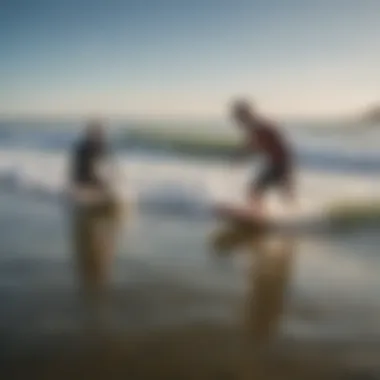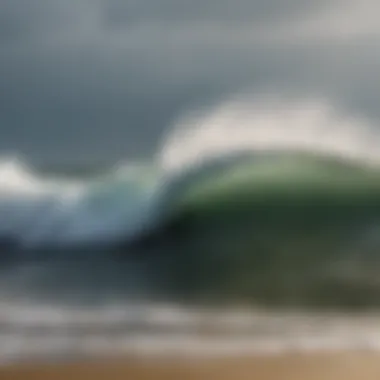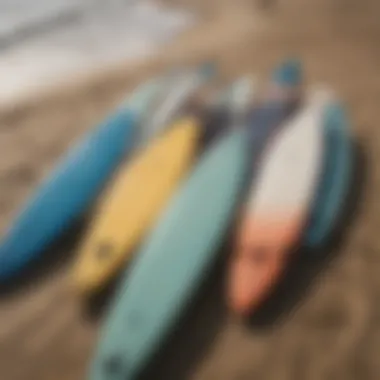Discover the Best Surf Lessons in Virginia Beach


Intro
Virginia Beach is renowned for its diverse surf culture. With its captivating shores, it proves to be an ideal location for both aspiring surfers and seasoned wave riders. Whether you are about to put your foot on a surfboard for the first time or wish to master advanced techniques, understanding the nuances of surf lessons in this vibrant locale can enrich your experience immensely. A solid foundation in surfing often begins with quality instruction, and this article aims to provide thorough insights into the available options.
The importance of surfboarding techniques cannot be understated. As any surfer will confirm, the waves can be unpredictable, and knowing how to maneuver effectively is vital for safety and enjoyment. Another critical aspect of a successful surf experience is selecting the right gear. Your choice of surfboard and other necessities can impact how well you learn and progress.
Moreover, keeping your surfboard in prime condition ensures longevity. Often overlooked, proper maintenance extends the life of your gear and maintains performance integrity. Not everyone is aware of local surf spots tailored for various skill levels and preferences, from mellow waves for beginners to robust swells for experts.
In this seamless blend of interconnected topics, you will gather all essential facts to elevate your surfing endeavors at Virginia Beach, allowing you to dive deeper into this thrilling sport. So let’s begin with the first subject of interest, Surfboarding Techniques.
Intro to VA Beach Surf Lessons
Surfing is not just a sport; it is a way of liffe for many and an activity that brings relaxation, excitement, and connection to nature. Virginia Beach is an ideal location for this thrilling waterboard sport due to its extensive coastline and year-round moderate climate. However, for those just starting, surf lessons symbolize much more than just learning to catch a wave.
Taking surf lessons in Virginia Beach offers a structured environment for beginners, where safety and skill acquisition are prioritized. New surfers quickly find that entering the ocean without guidance can pose multiple risks. Therefore, professional instruction not only fosters confidence but also emphasizes crucial aspects such as ocean safety, etiquette, and awareness of local surf conditions.
An important part of surf lessons is jest the understanding of the craft itself. Learning to read the beach, the tides, and the swells can greatly influence a beginner’s success. Quality surf lessons aim to build resilience and foster a fun avarage among participants. Additionally, social aspects cannot be understated. Many individuals find camaraderie among fellow surfers, making the experience as enjoyable as it is educational.
In summary, the introduction to surf lessons in VA Beach invokes essential elements of safety, skill, and culture. By enrolling in classes, novices equip themselves with necessary tools to not only embrace surfing but also to appreciate the surrounding environment of Virginia Beach. The article that follows will explore these aspects in greater detail to shed light on making informed choices about adapting to this demanding sport.
The Importance of Surf Lessons for Beginners
For newcomers, understanding the significance of surf lessons is crucial. Surfing can be thrilling, but without proper guidance, it can also be dangerous. Surf lessons for beginners provide an essential foundation that promotes safe practices, instills confidence, and lays the groundwork for developing skills.
Understanding Ocean Safety
Ocean safety is a vital component of surf lessons. Many beginners may underestimate the ocean's power. It is essential to understand currents, tides, and local weather conditions that can affect safety. In a good surf school, instructors emphasize the rules of the ocean, teaching students how to identify potential dangers, such as rip currents, submerged rocks, or changing weather patterns. They often highlight the following points:
- Assessing the Wave Conditions - Understanding the size and frequency of the waves is crucial.
- Knowing Your Limits - Beginners should not push themselves into situations they are not ready for.
- Observing the Locals - Watching experienced surfers can provide insights into safe practices.
"Safety first should always be at the forefront of surfing pedagogy, for the ocean commands respect and awareness."
Encouraging a solid grasp of these safety aspects not only protects learners but also cultivates a respect for the ocean and a lifelong sense of enjoyment.
Building Fundamental Skills
Another significant aspect of surf lessons for beginners is the development of fundamental skills. Without these basics, riders may struggle or become frustrated during their sessions. Potentially overwhelming moments can turn into adventure with effective, step-by-step skills development. Key skills taught in these lessons generally include:
- Paddling Techniques - Understanding how to paddle efficiently is an essential placement to maximize energy and maintain momentum.
- Pop-Up Methods - The ability to transition from lying down on the board to standing is fundamental and needs practice.
- Balance and Control - Focusing on body positioning, weight distribution, and making small adjustments helps gamers manage the board effectively.
Lessons often incorporate practice drills designed to reinforce these fundamental skills, providing a framework for continued progress as surfers move from understanding their gear to performing techniques. As such, lessons are designed to enhance overall abilities and promote improvement in diverse surf scenarios.
Types of Surf Lessons Offered in VA Beach
Surf lessons in Virginia Beach come in various forms, each designed to suit different preferences and needs. Understanding the types of surf lessons available is crucial for both beginners and seasoned surfers looking to refine their skills. Each category offers unique benefits, making it essential to choose one that aligns with a surfer's goals and comfort level.
Group Lessons
Group lessons provide an affordably priced way for beginners to get started in surfing. These classes often have several students on the water at the same time. The main advantage of participating in a group lesson is the sense of camaraderie. Surfers learn together, face common challenges, and celebrate each other's successes.
The structure of group lessons generally accommodates multiple skill levels. Instructors can tailor individual attention to those needing more support while keeping an eye on overall safety. Typically, the class size is manageable, allowing instructors to focus on fundamental skills such as paddling, popping up, and balancing on the surfboard.
Consider attending a group lesson for:
- Social Engagement: Meeting fellow surf enthusiasts can enhance motivation and fun.
- Cost Efficiency: Overall lesson rates are generally lower compared to private sessions.
- Shared Experiences: Learning from peers can also facilitate personal growth.
However, one potential downside is the limited personalized feedback due to the higher student-to-teacher ratio. Each individual's performance may vary significantly, making it harder for instructors to focus solely on students who may need more attention.


Private Lessons
Private lessons are tailored specifically for individuals or small groups. They provide focused, one-on-one instruction, which can be particularly beneficial for beginners who may feel uncomfortable in group settings.
The key advantages include:
- Personalized Instruction: The instructor can customize the lesson based on specific needs and skill levels.
- Accelerated Learning: With dedicated time and attention, the learning curve tends to improve substantially.
- Flexible Scheduling: Private lessons can often be booked at times that best suit the learner's schedules.
Though more expensive than group lessons, private lessons present an excellent opportunity for a deep learning experience, especially for those serious about progressing quickly.
In short, tking a private surf lesson captures the essence of personalized teaching focused on helping students overcome challenges and realize their potential.
Kids' Surf Camps
Kids' surf camps provide an engaging environment for younger surfers to learn and practice their skills. These camps usually run for several days and combine instruction with fun ocean activities.
Significant benefits of kids' surf camps include:
- Skill Development: Young surfers can build foundational skills in a supportive atmosphere.
- Peer Interaction: Camps promote teamwork and social skills as children learn alongside one another.
- Life Skills: In addition to surfing, kids gain confidence, sportsmanship, and learn respect for the ocean.
Often, surf camps blend fun activities with critical safety elements, promoting awareness of ocean conditions that might affect inexperienced surfers.
Participating in a kids' surf camp gives experience that extends beyond just riding waves. It instills important lessons regarding environmental stewardship and a love for the ocean that can last a lifetime.
Choosing the Right Surf School
Choosing the right surf school is crucial for anyone looking to gain proficiency in surfing. A good surf school can set a strong foundation for your surfing skills. It plays a vital role in shaping your surfing journey and ensuring that you have a safe and enjoyable experience on the waves.
Finding a surf school that aligns with your unique needs can greatly impact your learning speed and enjoyment. Different schools may offer varying teaching styles, curricula, and quality of instruction. Here are several key elements to consider when making your choice:
- Reputation: This reflects on the quality and safety standard of the school.
- Instructor experience: Qualified professional surfers generate confidence in their students.
- Facilities and equipment: Up-to-date gear enhances both comfort and safety.
Before diving into lessons, research is necessary to find partners that match your surfing aspirations.
Researching Local Schools
The first step in choosing a surf school involves taking time to research local options in Virginia Beach. You can start by searching online for listings and websites dedicated to surf schools. Many of these provide comprehensive brochures detailing the services they offer.
Consider attending events or workshops hosted by surf schools. This provides an opportunity to meet instructors and current students, sort of like a mini-interview before committing your time and resources. Here are some ways to gather information:
- Consult online directories that establish schools with track records.
- Browse social media for additional insights on surf schools’ community presence.
- Connect with locals, perhaps in Reddit groups or Facebook communities related to surfing, for recommendations.
Assessing Instructor Qualifications
Instructor qualifications should not be overlooked. Beyond certifications, the experience level can significantly impact how well you learn. A seasoned instructor blends practical knowledge with effective teaching methodologies. Look for:
- Certifications: Ensure instructors hold valid CPR and first-aid certification alongside surfing qualifications.
- Experience level: How long have the instructors been teaching? Can they share personal surfing experiences or encounters?
- Teaching style: Each instructor may have a unique way to approach teaching. Finding one that resonates can enhance your learning experience.
Classes led by knowledgeable instructors will heighten your overall learning outcomes.
Reading Reviews and Testimonials
Once you narrow down surf schools of interest, reading reviews adds a layer of objectivity. It's insightful to uncover insights from previous students about how their experiences were shaped during lessons.
Pay attention to recurring themes across reviews. Consistent praise or criticism plaved the importance of highlights such as:
- Student-instructor relations: A supportive atmosphere fosters learning and raises confidence.
- Class organization: How well-structured are the lessons? Is there room for individual exploration and improvement?
- Outcome effectiveness: Did students feel improvement or gain mastery in techniques over their lessons?


Check multiple sources to cross-reference feedback, ensuring you have all basis about choosing the right perspective.
Essential Surfing Equipment
When learning to surf, the right equipment is crucial. Choosing essential surfing equipment can enhance both safety and performance. A well-chosen surfboard and appropriate gear are foundational to a positive surfing experience.
Choosing the Right Surfboard
Surfboards vary widely, and each type has unique characteristics. Novices should consider a soft-top board. These boards are wider and more stable, which is helpful for balance. They are also less likely to cause injury. As surfers gain skills, they might experiment with hard-top boards. These boards are designed for performance and can improve speed, maneuverability, and progression.
Here are key factors to consider when selecting a surfboard:
- Size and Volume: A bigger board can offer more buoyancy, making paddling easier for beginners.
- Shape: Shortboards are meant for performance, while longboards provide stability. Transitioning between styles is a part of the learning process.
- Material: Durable materials resist wear, particularly when learning the ropes.
- Fin Configuration: Different fin setups affect the board's handling in the water. Experimenting with different fins can enhance skills.
Ultimately, the right surfboard encapsulates personal style and the type of surfing you aim to pursue. For best results, after instructor guidance seeking recommendations at local surf shops can be invaluable.
Wetsuits and Safety Gear
Using a wetsuit can significantly enhance comfort in cold waters. A correct wetsuit fits snugly, offering thermal insulation for surfers. Other than temperature, wetsuits also act as a barrier against potential hazards in the ocean.
When considering safety gear, important items from are recommended:
- Leash: Your surfboard can float away during a wipeout. A leash keeps the board connected.
- Helmet: In crowded surf areas or during competitive surfing, a helmet may protect the head.
- Surf Wax: Adequate grip is necessary for performance. Surf wax is a budget-friendly and vital tool to ensure grip on the board, especially if conditions are slippery.
Understanding Local Surf Conditions
Mastering surfing is not solely about the ability to stand up on a board; it requires a deep understanding of local surf conditions. For surfers in Virginia Beach, this knowledge is crucial. Awareness of environmental factors can significantly affect the quality and safety of the surfing experience, ensuring one returns home in good spirits.
Factors such as species behavior, local winds, and coastal geography dictate waves. Grasping how these elements work together not only enhances the surfing experience but also increases safety. Thus, understanding local surf conditions enriches the overall journey through cruising the Atlantic waters.
Tides and Swells
Tides play a significant role in surfing conditions. In Virginia Beach, the tidal shifts change water depth and, consequently, wave formation. Tubing and pounding waves often appear during higher tides, while lower tides might result in more forgiving conditions. Knowing the tidal schedule can enhance one’s surfing experience.
Swells are another key aspect. Swells come from distant storms and are often measured in feet. High swells create more formidable waves. Surfers can consult surf reports to find renowned global wave trackers like Surfline or Magicseaweed, which provide forecasts for the water. Being aware of both tides and how swells react to local conditions helps in planning successful surf days.
- Some standout tips regarding tides and swells that one should keep in mind include:
- Check the National Oceanic and Atmospheric Administration (NOAA) for tidal predictions.
- Monitor local forecasts frequently, as conditions can change rapidly.
- Consider actually visiting the beach before scheduled surf times to observe the sea, enhancing observational skills.
Best Times to Surf in VA Beach
Timing when you hit the surf is essential for a rewarding experience. Generally, early mornings and late evenings are preferred by experienced surfers. During these periods, winds tend to be gentler, and the water is often glassy, presenting ideal surfing conditions.
Moreover, seasonal factors can impact surfing opportunities. For Virginia Beach, summer offers both light winds and warmer water. However, fall can provide some spectacular swells generated by hurricanes. Therefore, adjusting best surfing times according to the season and other surf condition variables becomes paramount.
- Consider these best surfing periods:
- Early Morning: Calm winds, fewer distractions.
- Late Afternoon to Sunset: Less congested waves creating flexibility on the board.
- Hurricane Season: Elevated and captivating swells, but always consider the storm's severity.
In summary, understanding local surf conditions unfolds many opportunities and benefits for both novice and skilled surfers in Virginia Beach. Furthermore, attentiveness to tides and swells not only influences performance but also enriches the enjoyment found within surfing. This engagement with nature makes the pursuit more fulfilling and offers lasting insights into mastering the ocean.
Tips for Maximizing Your Surfing Experience
Maximizing your surfing experience at Virginia Beach goes beyond just standing on a board. Succeeding in the water involves a blend of skill, knowledge, and preparation. This section addresses pivotal considerations that can enhance your time in the waves, including goal-setting, patience, and practice.
Setting Realistic Goals


Setting achievable goals is key for any surfer, especially beginners who may feel overwhelmed. Start with small, specific goals. Instead of trying to master an advanced maneuver, focus on learning how to balance on the board first.
- Evaluate Your Skill Level: Understanding your current abilities can help set proper goals. Know what you can reasonably achieve at your starting point.
- Incremental Steps: After mastering basics, aim for slightly more challenging tasks. For instance, once you can paddle effectively, try catching your first wave!
- Track Progress: Write down milestones. This can help you see improvements over time, reinforcing your determination.
- Competitive Outlook: If you aim to compete, familiarize yourself with the requirements of your desired competition level. It helps to set goals that are both time-sensitive and clear. Remember, these goals should inspire you but not pressure you.
Practicing Patience and Persistence
In surfing, you will face challenges that test your resolve. Patience and persistence are vital.
- Understand the Learning Curve: Learning to surf doesn’t happen in a few days. Make sure to recognize that mastery takes time, divide your learning into phases.
- Keep Calm: During times of frustration, staying calm can help you train your focus back on the basics, whether it is paddle technique or balance.
- Consistent Practice: Like any sport, frequent practice is essential. Set asegular schedule where you can work on your skills. Regular sessions allow you to iterate on techniques and gain confidence in your abilities.
- Community Support: Surrounding yourself with fellow surfers can foster a culture of patience. Engage with experienced surfers who can provide insights and encouragement.
By setting realistic goals and embracing a mindset of patience, you will find more enjoyment and growth in your surfing experience.
By balancing ambition with acceptance, you create a constructive path forward in your surfing journey.
Surfing Etiquette
Surfing etiquette plays a crucial role in ensuring the safety and enjoyment of the surfing environment, especially in busy areas like Virginia Beach. Understanding and practicing good etiquette helps to foster a sense of community among surfers and contributes to a respectful coexistence on the waves. In this section, we will delve into two key components of surfing etiquette: respecting fellow surfers and understanding right of way.
Respecting Fellow Surfers
Respecting fellow surfers is not just a matter of courtesy; it is essential to maintain a positive atmosphere in the water. Recognizing that most people flock to the surf for enjoyment means you should share the waves responsibly. Here are a few important points to consider:
- Maintaining Distance: It is critical to keep a respectful distance from other surfers. Crowding in on someone can lead to uncomfortable situations or even accidents.
- Communication: If you are paddling out and see someone heading your way, a simple nod or wave can help indicate your intention. Acknowledgment goes a long way in building camaraderie.
- Acknowledging Skills: Remember that not every surfer has the same level of expertise. Showing kindness to beginners as they learn ensures everyone can enjoy their experience.
To enhance your experience in the water, it is best to embrace an attitude that prioritizes fun over aggression.
Understanding Right of Way
Understanding the concept of right of way is essential for all surfers. It denotes who has priority when catching waves. Misunderstanding these principles may cause conflicts or dangerous situations. Here are several rules that clarify this aspect of surfing."Right of way" typically refers to the surfer closest to the breaking wave having priority to ride it. Here are ways to understand and embrace this principle:
- Position Binding: A surfer sitting on a wave’s peak has the right of way over someone in a less advantageous position, say further down.
- Avoid Paddling: Paddle for waves only if it is clear that you will not interfere with someone else's ride. Dropping in can be harmful and rude.
- Addressing Availabilities: Surfers should only go for a wave when they are confident they will not disrupt someone already established on it.
Incorporating these elements of surfing etiquette can significantly uplift collective surfing experiences in Virginia Beach. Not just governed by rules, being mindful of others ensures that everyone can participate safely and peacefully on the waves.
"In the ocean, etiquette is as important as skill. Treat others with respect, and everyone wins."
Local Surf Culture in Virginia Beach
Understanding the local surf culture in Virginia Beach is essential for anyone looking to engage deeply with surfing beyond the basics. This culture encapsulates insights into the community dynamics, associate traditions, shared experiences, and the surf’s impact on local identity. It serves as the backbone for fostering connections among surfers, encouraging camaraderie, and constructing a sense of belonging which is crucial for newcomers.
Local surf culture is characterized by its welcoming spirit, which often stems from many veteran surfers who openly share knowledge and tips with beginners. This willingness to teach creates an enriching environment, noticeable during competitive events or casual beach gatherings. Moreover, these surfers embody respect for the ocean and appreciate shared riding space.
While each surfing locale offers a unique vibe, Virginia Beach flourishes within the tight-knit community that emphasizes a sense of responsibility toward both surfing and the marine environment. Attending local events or simply spending time at the beach can provide newfound surfers with a chance to know local characteristics beyond the surfboards.
Closure: The Path to Becoming a Better Surfer
Surfing is not just about riding waves. It is a journey. This journey involves constant learning and growth. Becoming a better surfer involves several factors, all tied to the practices established through surfing lessons and overall engagement with surf culture.
Importance of Consistent Practice
The key aspect of improving one’s surfing ability lies in consistent practice. Surf lessons provide the foundation, equipping students with essential techniques and safety knowledge. However, growth comes from applying these lessons repeatedly. Going out into the water, facing different ocean conditions, and carefully analyzing one's performance are essential steps on this journey. Over time, these small, incremental improvements compound to enhance one’s skills.
Firsthand Experience & Understanding Conditions
Understanding local surf conditions can greatly impact a surfer’s progress. Each day at Virginia Beach offers a new experience, from the changing tides to varying wave patterns. The more time spent in surf conditions, the better one gets at reading the ocean. This firsthand experience allows surfers to make more informed decisions regarding paddle positioning and wave choice, which ultimately leads to more opportunities for riding waves successfully.
"Each session is a chance to learn something new, whether it is about the ocean, the board, or oneself."
Physical Fitness and Stamina
Surfing demands physical fitness. Strenght and stamina play crucial roles in performance. Incorporating physical exercises tailored for surfing strengthens core muscles and enhances balance. Surf schools in Virginia Beach often stress the significance of fitness, sometimes offering associated training or recommendations for exercising on land to tumbles into a balanced surfing skill set.
Mental Resilience
Surfing isn’t just a physical challenge—it also requires mental resilience. Facing tough conditions, falling off wave forms, or even dealing with injuries are part of it. Remaining patient and working through these challenges builds character. Lessons often emphasize the importance of mental toughness as an asset that separates adept surfers from those who struggle.
Next Steps
• Continuing education through surf lessons, particularly as one's skills evolve.
• Exploring community surf events to enhance understanding of surfing industry and culture.
• Setting short and long-term goals to maintain motivation and provide clear benchmarks.







